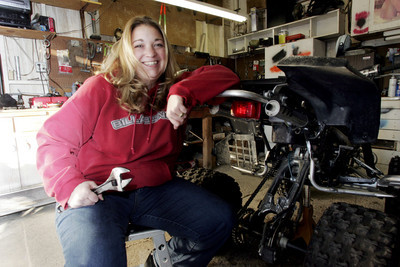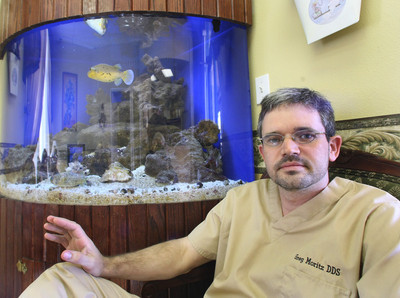BACK TO BARTERING
For wife and husband Amanda and Shannon Barr, marriage brought with it a whole set of new, and sometimes expensive, responsibilities.
But it didn't come with additional finances.
"We needed things, but we didn't have money," says Amanda Barr, who married her husband five years ago. "We noticed other people needed things, but they didn't have money."
Instead of going without, they turned to an ancient custom that, over the past few months, has become increasingly popular across the nation: The Barrs started trading their stuff for other people's stuff.
At first, they bartered with people they encountered through work or friends. Recently, the couple have joined a growing number of people who are using Web sites such as craigslist to offer their services or goods in exchange for anything of value.
According to a craigslist spokeswoman, the site has seen a "significant growth in our bartering section as craigslist users get creative to keep their cash in their wallets during this troubling economy."
In November, 1,681 Las Vegans posted ads on craigslist offering trades. That's up from November 2007 when 1,081 ads were posted.
The Barrs placed an ad in December offering mechanical work, housecleaning, welding, yardwork or massage to anyone who had a Barbie Power Wheels Jeep to trade. It was to be a gift for their 3-year-old daughter, one they couldn't afford to buy. They haven't found any takers, yet, but Amanda Barr says they've had many past successes.
"It's actually worked out really well," she says. "We helped people move last week and they said, 'Whatever we don't fit in the van, you guys can have.' "
They have traded for tools, dirt bikes, four wheelers, home goods and other items.
Wendy Mackin has a 65-inch HDTV. She bought it three years ago for $7,000 but wants to replace it. For two weeks, she tried to sell the TV but had no takers. Finally, Mackin offered it on craigslist in exchange for an exterior house paint job, landscape work, irrigation repair or other outside work.
The response was strong and immediate. She negotiated a deal with a licensed painter.
"People ... are losing their jobs" and don't have cash to spend, so it's no surprise that they're turning to bartering, says dentist Greg Moritz of Alpha Dental.
He started bartering about 18 months ago through IMS, a barter network. A few months later, Moritz posted on craigslist offering dental treatment for items of value.
"The office was a little bit slow" when he started trading, Moritz says. "I thought if I could get IMS money, it might help out with overhead. I didn't know what I could do with it."
Barter networks are slightly different from direct trading, says David Heller, a locally based broker for the barter network ITEX. It's still trading because cash is never involved, except when paying the broker fee.
Members of the trade exchange use ITEX dollars to buy goods and services from other members, Heller explains. For instance, a graphic designer might go to an eye doctor who is a member of the barter network. The eye doctor doesn't need design work but he can use the network "money" paid to him in order to purchase something from a different member.
Moritz has traded on his network for advertising, printing and other services related to his practice and estimates that he pays about 15 percent of his overhead with barter money. A skeptic turned believer, Moritz not only recommends barter networks to business owners but considers it a necessary tool for uncertain economic times.
Moritz also has made direct trades with patients for things such as new tile in his office, a paint job and even maintenance for the office fish tank. That can be a good deal for a skilled worker with little dental insurance.
"Sometimes, I look for opportunities where I know it might be difficult for people to get good treatment because the treatment plan is too expensive," says Moritz, adding that implant work can cost thousands of dollars.
People have offered things he can't use, such as karate lessons, haircuts, repair work and massages. Moritz trades when he can but there is a limit, he says.
Bartering can be traced back to ancient times, but was replaced by a more efficient economy based on money, notes Keith Schwer, director of the Center for Business Economic Research at the University of Nevada, Las Vegas.
In the past, it took too long to barter, because people had to search to find something they wanted for something they had. The Internet eliminates some of the inconvenience of bartering, Schwer says.
"I suspect in this soft economy, people say 'I may be out of a job but I can raise some revenue by doing these things.' They have the time to do it. Some people may have found this is a way to add to their current economic status."
Contact reporter Sonya Padgett at spadgett@reviewjournal.com or 702-380-4564.


















